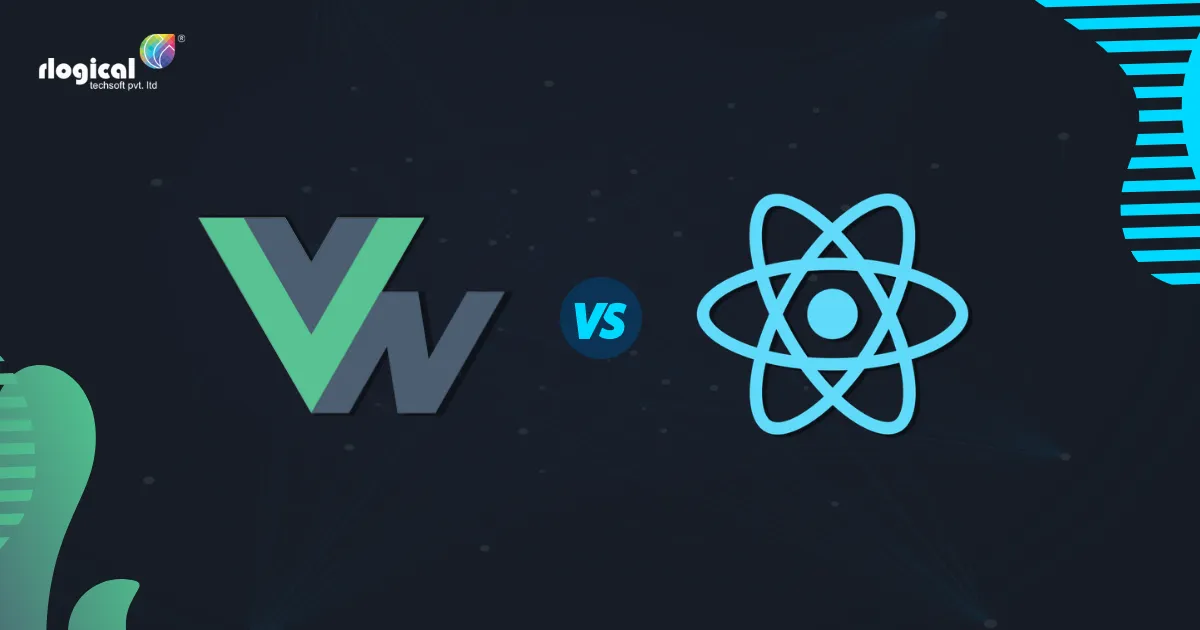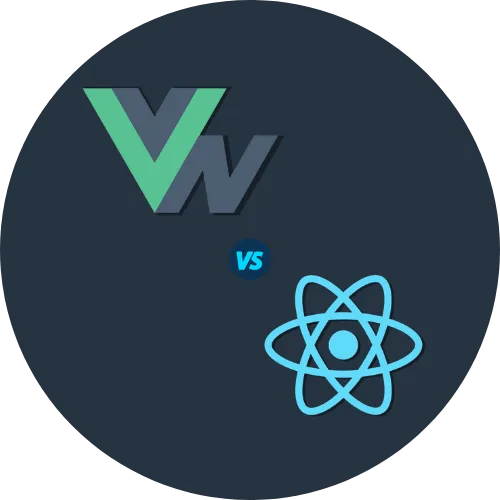
Blog Overview: The JavaScript-based solutions are indeed popular and effective for making modern web applications. Vue and React are the trending and topmost of such technologies. Many founders find it difficult to choose among them. Both have robust benefits and limitations. So, here’s a comparison between Vue Native vs React Native for choosing the high-performing solutions. Read and make the correct decision for your business project!
It is a fact that with every single update, JavaScript frameworks are increasing in versatility. The two most well-known frameworks happen to be React and Vue, which have been the top JavaScript frameworks for quite some time. Both of them make use of virtual DOMs and consist of reactive as well as component-based elements.
Although Vue and React share identical use cases and also try to accomplish similar objectives, their approaches and structures are quite different. In the following paragraphs, we will mention the functionality of both and the main differences between React native vs Vue native.
React vs Vue: Applications
React as well as Vue are employed in web development, especially for web applications. Both of them come with their benefits as well as downsides. Vue happens to be the preferred choice for lots of startups because of its fast performance.
The most notable thing regarding React is its popularity and rich ecosystem. It happens to be the most well-known JavaScript framework on the market with lots of free tools, educational resources, and libraries. Consequently, React can accommodate big projects. React will be the preferred choice in case one provides higher priority to rich functionality as compared to speed. However, React vs Vue is a comprehensive topic which also raises the query of why it’s necessary to compare them. So, here’s the actual reason why comparing Vue native and React native.
Why do We Compare React and Vue?
Vue is becoming increasingly popular day by day, and the Hire React developers are thinking of switching over to a better-performing and faster Vue JS. Nevertheless, Vue comes with its drawbacks being a comparatively new technology. For this reason, it is significant to compare React native vs Vue native meticulously.
What Exactly is Vue JS?

Vue JS framework has been created for UI development and design. The main functionality has been focused on interface-related tasks. It will be possible to integrate it for the development of interface into any JS project while making use of one more JS framework to develop complicated operations. The primary objective of Vue will be to manage the software’s view.
Compared to React, Vue permits working with animation, and its core functionality happens to be much more versatile. It is significant to set up many more additional libraries for getting the level of functionality depth of Vue to React.
Must Read: Develop Web Apps Using React and Node JS
What Exactly is React?
React happens to be a competent JavaScript library and framework for the development of UI. React was able to obtain a rich ecosystem in the time, which enabled the tool to become accountable for complicated data processing, UI processes, personalization, and so on. It happens to be a more standalone tool unlike Vue, even though it is likewise integrated with other libraries on some occasions.
React Native app development is not restricted to the development of the web only. It can also be used for hybrid mobile app development. Although Vue comes with a similar feature, it is not as well-known as the solution to React, which is supported and developed by Facebook.
Why is Vue JS used by Developers?
Software developers like to make use of Vue mainly because of its efficiency as well as simplicity. As compared to most of the JS frameworks at present, it is more elegant and simpler. The flow appears to be natural while coding on Vue JS. All the operations are quite sensible out there.
- A comfy design: It is evident that the design of Vue JS has been cut out properly given that it is straightforward and logical.
- Only one syntax: The identical logic is used by Vue JS for writing the old User Interface functionality. There is no requirement to adapt to lots of syntaxes and go through more than one tutorial for writing an innovative feature. In case a Vue JS file is sent to you by a developer, you will be able to comprehend it without any explanation, unlike React.
- Effective official plug-ins: An assortment of official libraries is provided by Vue JS for procedures such as routing.
- It is not supported by corporations: According to some developers, it will be an advantage in case a framework is backed up by Facebook or Google. However, for others, the support provided by companies exploiting user data is not recommended.
Small teams often make use of Vue JS for developing medium-size projects. Vue stands out with its simplicity, and this makes it the preferred choice for products that are minimum viable. Nevertheless, despite all these advantages, Vue is not the best among the alternatives of React out there.
Why is React used by the developers?
React happens to be the initial JavaScript front-end framework for lots of developers. A lot of teams, which never used JavaScript frameworks before beginning their quest to React, since it happens to be the most well-known, and biggest one. Below, we have mentioned the most significant reasons why several developers like to work in React.
- It becomes easy to write custom components with the help of JSX. It is a syntax extension employed by React, which enables you to write your components using HTML. It’s used for the development of Web apps with enhanced functionality and user interface, given that inbuilt solutions are not going to be enough.
- SEO-friendliness: It is quite tough to optimize web applications that have been written in JavaScript. It is often not possible for the search bots to process content correctly on pages that are JavaScript-based.
- Mobile app development is supported by React: You will not find it hard to learn React Native, in case you understand React. You will be able to follow identical patterns and also make use of similar syntax. React Native comes with many advantages (enhanced functionality, enhanced development speed, and so on), and it will be quite easy to work with React Native in case you know React.
- Fast React Developer Tools: It will be possible for you to access custom Firefox and Chrome extensions while installing the framework. These are referred to as React Developer Tools, which help in software development and design, organizing code, verifying connections between different features, creating competent hierarchies, and so forth.
Of course, the most significant benefit provided by React as compared to other frameworks happens to be its flexibility and universality. The framework’s rich ecosystem enables the creation of enhanced functionality, improving performance constantly, and also adapting the application to lots of devices and browsers.
Must Read: Guide to Build Mobile App using Vue Native
React Vs Vue: Differential Overview
React |
Vue |
| Library to build UI | A Framework |
| Founded March 2013 | Founded February 2014 |
| If you want to develop SPA & Mobile Apps | Advanced SPA & started supporting Native App |
| A little bit easier than Angular | A small learning curve |
| Based on Virtual DOM (Document Object Model) | Based on Virtual DOM (Document Object Model) |
| Written in JavaScript | Written in JavaScript |
| Facebook Developers Community | Open-source project sponsored through crowd-sourcing |
| Used by Facebook, Uber, Netflix, Twitter, Reddit, PayPal, Walmart, etc. | Used by Alibaba, Baidu, GitLab, and others |
Comparison of Vue Native Vs React Native
Most probably, you understand which particular framework is going to be appropriate for your project and development type. Nevertheless, it is significant not to make any final decision very quickly. Now, we will be analyzing the detailed difference between React Native vs Vue Native frameworks side-by-side.
Popularity:
It is a fact that JavaScript frameworks will be evolving constantly. While React had been developed in the year 2013, Vue JS was developed in 2014. It did not take much time for these tools to become the most well-known front-end solutions for development out there. For this reason, there is a constant change in statistics on popularity, and it will not be possible to understand which innovative framework is going to become popular during the subsequent couple of years.
A minimum of 1,700,000 sites are making use of React at present. As per Stack Overflow, it happens to be one of the most popular development frameworks for most software developers. It happens to be a premier JavaScript framework at present on the market.
On the other hand, Vue Native app development projects are used by approximately 900,000 sites across the globe. According to the Stack Overflow JavaScript frameworks survey, it holds the second position following React JS.
Performance:
The Document Object Model is used by JavaScript frameworks for rendering HTML pages. Documents will be created in the structure of a tree, which is likewise referred to as a DOM tree. The effectiveness of the framework is defined by the performance and organization of DOM. The framework is going to work faster in case the procedure of developing and processing DOMs is intuitive and fast.
A virtual DOM is used by React, which happens to be a standalone object model independent of any browser. HTML pages are automatically rendered by this framework. Virtual DOM is likewise used by Vue, and the structural concepts are almost identical to those of React. For this reason, there is not much difference in the performance and speed quality of React Native app development and Vue Native app development.
Nevertheless, Vue happens to be quicker in terms of component creation as well as updates. It is imperative to re-optimize a component in React once any change is made. Every single component has to be identified with particular commands in that case. Once the project begins to scale, managing lots of components can be a quite difficult task.
Components are automatically tracked by Vue, and there is no need to identify every updated component out there. There is no requirement for extensive comments, and additional optimization will enhance the performance and speed of Vue JS.
Must Read: Why and How to Hire Full Stack Developers For Your Project?
Scaling:
Both React as well as Vue come with an effective routine as well as a scaling solution. For instance, let us evaluate Flux/Redux, which happens to command that permits monitoring and managing state modifications. It will be possible to organize state modifications into standalone functions. In case one of the functions undergoes several modifications, you will be able to divide them and also perform the modification separately.
React enables defining “dumb” as well as “smart” components. The smart components happen to be functions that can manage performance: they can figure out which actions should be performed by the dumb components in a particular condition. Smart components are not linked to DOM; rather, they work together with dull components that are going to affect the processes that are DOM-based.
On the contrary, there is no need for the dumb components to be excessively complicated. Their primary job will be to process “props” which happen to be instructions received from the smart components. This particular system helps to make React development simpler and also aids in making its performance faster. It is likewise a significant advantage when it comes to scaling: every single component is organized neatly when it comes to its responsibilities and complexity.
Both React as well as Vue come with tools that enable the generation of fresh projects. React comes with Create-react-app, while Vue can boast of having a CLI generator. Both of them permit the usage of templates as well as the handling of dependencies.
Although Vue provides enhanced performance speed and scaling projects, React JS comes with an enhanced ecosystem, additional tools, as well as more templates. For this reason, teams that want to develop smaller projects where speed happens to be an important aspect usually prefer Vue; on the other hand, React is appropriate for complicated web platforms.
Adapting to mobile gadgets:
React provides developers with React Native for creating iOS app and Android native apps with the identical structure of the React component. It is a fantastic solution given that developers will be able to make use of their knowledge regarding React Native to build mobile apps without employing any third-party framework.
Although Vue JS does not come with any identical custom solution, it supports Weex, which happens to be a UI framework. It uses Vue components for creating Android and iOS apps.
React will be the preferred option in case we choose between the 2. It happens to be a tried framework, and developers usually learn React Native because of it. On the other hand, Weex is not that popular, and the community is not that active.
Size:
While React’s default size happens to be approximately 100 Kb, that of Vue is approximately 80 Kb. Although this might not appear to be an essential factor initially, the performance of the app will become slower in case the JS code happens to be heavier. Being a library, that is smaller in size, Vue JS offers better efficiency and faster performance.
One more notable thing about Vue JS is that plenty of additional features will be obtainable on the default version. This implies that the plug-ins will be available in the default version, and it is not imperative to install a lot of additional libraries.
On the contrary, React depends on additional downloads. Consequently, new features have to be uploaded constantly, which makes the size much more than 100 KB.
Community:
An additional factor that is usually considered in terms of selecting a framework happens to be the community. Nevertheless, tools become much more independent at present, and users can drive the development of technology as well. This applies to Vue JS, and to a lesser degree to React.
React has been created and supported by Facebook pages for both negative as well as positive implications. Some developers do not like to rely on companies having a shady reputation, such as Facebook since they are scared of the fact that the corporations do not have the best interests of the users in their minds.
While depending on tech giants such as Google or Facebook, it is quite tough to foresee the genuine objectives behind the project.
On the contrary, it is almost certain that there is no chance for the project to be abandoned shortly. Fresh libraries are created by the official community, which also motivates events and comes across partners. However, Vue JS happens to be a personal project.
While Ewan Vue happens to be the main person developing this framework, Autocode is its primary sponsor. The team is extremely open, and you will be able to know about the individuals who are responsible for the tool from the very start. Although developers had been worried about the stability of a project initially, it received plenty of traction, and there had been much fewer concerns.
At present, Vue JS comes with an active community that can boast of having quite a few enthusiastic developers. They are enthusiastic regarding the project and do not intend to collect user data. Consequently, Vue JS is comparatively safer because it is not dependent on corporations.
Also Read: How to Install React Native on Mac? Step by Step Guide
Use cases: React vs Vue
Both these frameworks are extremely versatile because of official updates regularly, as well as community contributions. As a result, it is difficult to figure out exactly where Vue and React should be used. However, we will mention some examples of companies using React and Vue JS. Let us hope that it will provide you with a better idea regarding which framework is going to work best at which place.
React
React happens to be the preferred solution when it comes to social media. It has been created by Facebook, and therefore, its features will fit properly with the requirements of the social networks. At present, the framework is utilized by Instagram, WhatsApp, and Facebook. Quite a few libraries are linked with communication, community-based, as well as content-processing features. It is easier to find a React code for social media as compared to other frameworks.
When React should be used for Development?
- You are taking into consideration building a community-based platform (forum, marketplace)
- Development of social media (dating sites, social networks, and so forth)
- Complicated platforms have mobile and web functionality (React JS has React Native, which happens to be a flexible development framework and rich ecosystem).
As seen by the use cases of React JS, this framework is employed by platforms with lots of additional features.
Vue
Unlike React, Vue appears to be a less ambitious framework. It happens to be the premier solution for all web apps, which includes small utilities as well as single-page web apps. Nevertheless, it would be unjustified to assert that this framework will not be able to take care of larger projects. GitLab, which happens to be amongst the premier code repository platforms, has been built using Vue. Apart from this, Grammarly, as well as Nintendo also, makes use of this framework.
When Vue should be used for Development?
- Webpage apps which are small and are designed to be lightweight and fast
- Peer-to-Peer communities, SaaS, real-time platforms: Vue is going to be the preferred choice in case any platform has been designed for supporting real-time operations of more than one user mainly because of its efficient performance and speed.
- Content delivery platforms: Vue JS will be the right choice for innovative apps, magazines, content creation tools, and blogs. Apart from being quite fast, it also performs properly in low latency while offering sufficient additional functionality as well.
The main advantage of using Vue JS happens to be its simple maintenance as well as quick performance. Moreover, as compared to React, it is also quite easy to learn Vue. As a result, developers will take less time to learn and write in Vue.
Key Takeaways
There is no doubt about the fact that Vue JS, as well as React JS, happens to be premier JavaScript frameworks. Both these tools provide quick performance thanks to their lightweight syntax as well as high speed. Plenty of features are provided by Vue JS in the main platform, and React happens to be more stripped-down although, it will be possible to download extra libraries. Generally speaking, both these frameworks for developing complicated functionality by making use of templates.
React JS comes with a rich ecosystem that consists of remarkable libraries and templates. Although Vue JS likewise features additional functionality, it is yet to catch up with the opportunities provided by React. Vue vs React is a tough battle and the winner can be any of them depending on your project factors. So, you need to evaluate your project needs thoroughly to go with the right one.
We’ll conclude this article by asserting that while React happens to be more adaptive and versatile, Vue is comparatively smaller as well as faster. In case you want to hire developers, bear in mind that both of them come with their advantages as well as downsides. Although it is simpler to learn Vue, React happens to be more well-known, and consequently, it will be quicker to find hires.
Rahul Panchal
Rahul Panchal is the Founder & Managing Director at Rlogical Techsoft Pvt. Ltd. He is a pioneer tech enthusiast who has assisted diverse enterprise solutions with a fresh perspective over the years. From integrating technologies like Full-Stack, .NET, Flutter & PHP, he has harnessed custom web or hybrid mobile app development projects. His creative outlook on the latest models of AI, ML, blockchain, and IoT, has made various businesses attain leading-edge success.
Related Blog
- Native App vs Hybrid App vs Web App: Different Between App Types
- Flutter vs React Native: Which Frameworks Choose in 2025?
- How to Make an AR (Augmented Reality) App with Flutter: The Next-Gen App Solution
- MEAN Stack vs MERN Stack vs Full Stack: Which One to Choose?
- How to Build An MVP Application Like a Pro: The One-Stop Guide
Categories
- All
- AI Development Services
- Amazon Web Services (AWS)
- ASP.Net Development
- Azure Web App
- Big Data Analytic
- Customize
- Digital Marketing
- Drupal Development
- E-commerce web development
- Education Mobile App Development
- Enterprise Application
- Event Management App Development
- Fintech
- Fitness App Development
- Food Delievery
- Front-End Development
- Grocery App Development
- Healthcare App Development
- Hire Dedicated Developers
- Hotel Booking App
- IT Industry
- JavaScript Development
- Mobile App Development
- On Demand App Development
- On Demand Healthcare App Development
- PHP Development
- POS Software Development
- Real Estate Mobile App Development
- Retail Business App Development
- Salesforce
- Social Media Development
- Software Development
- Technology
- Transportation App Development
- UI/UX Design
- Web Design
- Web Development
- Web Services
- Web/Data Scraping Services
- WordPress




 Rahul Panchal in Technology
Rahul Panchal in Technology 





